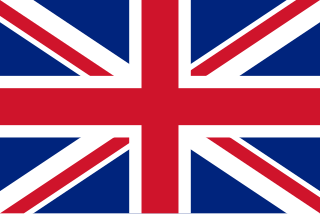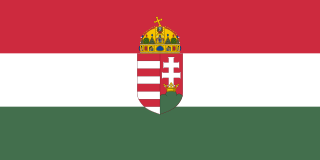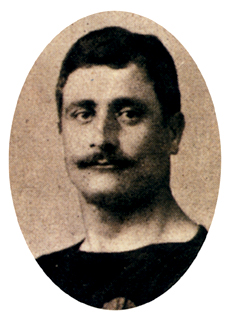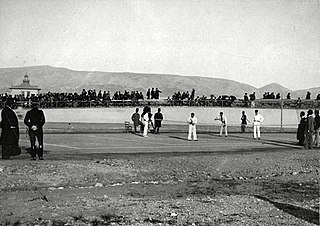
The 1896 Summer Olympics, officially known as the Games of the I Olympiad and commonly known as Athens 1896, were the first international Olympic Games held in modern history. Organised by the International Olympic Committee (IOC), which had been created by French aristocrat Pierre de Coubertin, the event was held in Athens, Greece, from 6 to 15 April 1896.

Greco-Roman, Graeco-Roman, or classic wrestling (Euro-English) is a style of wrestling that is practiced worldwide. Greco-Roman wrestling was included in the first modern Olympic Games in 1896 and has been in every edition of the summer Olympics held since 1904. This style of wrestling forbids holds below the waist, which is the main feature that differentiates it from freestyle wrestling. This restriction results in an emphasis on throws, because a wrestler cannot use trips to bring an opponent to the ground or hook/grab the opponent's leg to avoid being thrown.

Algeria competed at the 2004 Summer Olympics in Athens, Greece from 13 to 29 August 2004. It first competed in the Olympics in 1964, and entered the 2004 Athens Games having won a total of twelve medals — including one gold, one silver, and three bronze medals at the 2000 Summer Olympics. These medals were in athletics and boxing. 61 competitors, 46 men and 15 women, took part in 57 events in 10 sports.

Poland competed at the 2004 Summer Olympics in Athens, Greece, from 13 to 29 August 2004. This was the nation's eighteenth appearance at the Summer Olympics, except the 1984 Summer Olympics in Los Angeles, because of the Soviet boycott. The Polish Olympic Committee sent a total of 194 athletes to the Games, 132 men and 62 women, to compete in 21 sports. Men's volleyball was the only team-based sport in which Poland had its representation in these Olympic Games. There was only a single competitor in women's taekwondo.

Sweden competed at the 2004 Summer Olympics in Athens, Greece, from 13 to 29 August 2004. This nation has competed at every Summer Olympic Games in the modern era, except for the 1904 Summer Olympics in St. Louis. The Swedish Olympic Committee sent the nation's smallest team to the Games since the 1976 Summer Olympics in Montreal. A total of 115 athletes, 62 men and 53 women, competed only in 20 different sports. Women's football was the only team-based sport in which Sweden had its representation at these Games. There was only a single competitor in boxing, diving, artistic gymnastics, judo, modern pentathlon, and rowing.

Norway competed at the 2004 Summer Olympics in Athens, Greece, from 13 to 29 August 2004. This was the nation's twenty-fourth appearance at the Summer Olympics, except for the 1904 Summer Olympics in St. Louis, and the 1980 Summer Olympics in Moscow, due to the country's support of the United States boycott. With the absence of women's football and handball teams, Norwegian Olympic and Paralympic Committee and Confederation of Sports sent the nation's smallest delegation to the Games since the 1968 Summer Olympics in Mexico City. A total of 53 athletes, 36 men and 17 women, competed only in 12 different sports. There was only a single competitor in badminton, swimming, taekwondo, weightlifting, and wrestling.

Carl August Berthold Schuhmann was a German athlete who won four Olympic titles in gymnastics and wrestling at the 1896 Summer Olympics in Athens, becoming the most successful athlete at the inaugural Olympics of the modern era. He also competed in weightlifting.

Germany competed at the 1896 Summer Olympics in Athens, Greece. The Germans were the third most successful nation in terms of both gold medals and total medals (13). Gymnastics was the sport in which Germany excelled. The German team had 19 athletes. The Germans had 75 entries in 26 events, taking 13 medals.

Ten athletes from the United Kingdom of Great Britain and Ireland competed in seven sports at the 1896 Summer Olympics. The Great Britain athletes were the fifth most successful in terms of overall medals (7) and tied for fifth in gold medals (2). The 7 medals came on 23 entries in 14 events.

Greece was the host nation of the 1896 Summer Olympics held in Athens. The number of Greek contestants is commonly cited as 169, but as many as 176 Greeks contested events in all nine sports. The Greeks were by far the most successful nation in terms of total medals with 47, 27 more than the United States of America. Nevertheless, their number of first-place finishes (10) was one fewer than the Americans' 11. The Greeks had 172 entries in 39 events. Only 4 events had no Greek entrants—the 400 metres and the high jump in athletics and the vault and the team horizontal bar in gymnastics.

Hungary competed at the 1896 Summer Olympics in Athens, Greece. Austrian and Hungarian results at early Olympic Games are generally kept separate despite the union of the two nations as Austria-Hungary at the time.

Momčilo Tapavica was an all-around sportsperson, competing in tennis, weightlifting, wrestling. Tapavica achieved his best result in tennis by winning the singles bronze medal at the 1896 Summer Olympics, making him the first ethnic Serb, Slav and Hungarian citizen to win an Olympic medal. After his sporting career Tapavica became a well-known architect.

Georgios Tsitas was a Greek wrestler. He competed at the 1896 Summer Olympics in Athens.

Stephanos Christopoulos was a Greek wrestler. He was a member of Gymnastiki Etaireia Patron, that merged in 1923 with Panachaikos Gymnastikos syllogos to become Panachaiki Gymnastiki Enosi.

The men's discus throw was one of two throwing events on the Athletics at the 1896 Summer Olympics programme. The discus throw was the fourth event held. It was contested on 6 April. 9 athletes competed, including one each from France, Sweden, the United States, and Great Britain as well as three Greeks and two Danes.

The men's singles was one of two tennis events on the Tennis at the 1896 Summer Olympics programme. The fifteen entrants were seeded into a single-elimination tournament, with thirteen competing. They represented six nations.

The men's doubles was one of two tennis events on the tennis at the 1896 Summer Olympics programme. The six pairs that entered were seeded into a single elimination tournament. Only five actually competed, hailing from four nations but entering as three Greek teams and a pair of mixed teams. It was the only event in the 1896 Summer Olympics that had mixed teams.

The Russian Empire (Russia) competed at the 1912 Summer Olympics in Stockholm, Sweden. 159 competitors took part in 62 events in 15 sports.

Denmark competed at the 1920 Summer Olympics in Antwerp, Belgium. 154 competitors, 150 men and 4 women, took part in 66 events in 14 sports.
The Greco-Roman middleweight competition at the 1912 Summer Olympics was part of the wrestling programme.




















